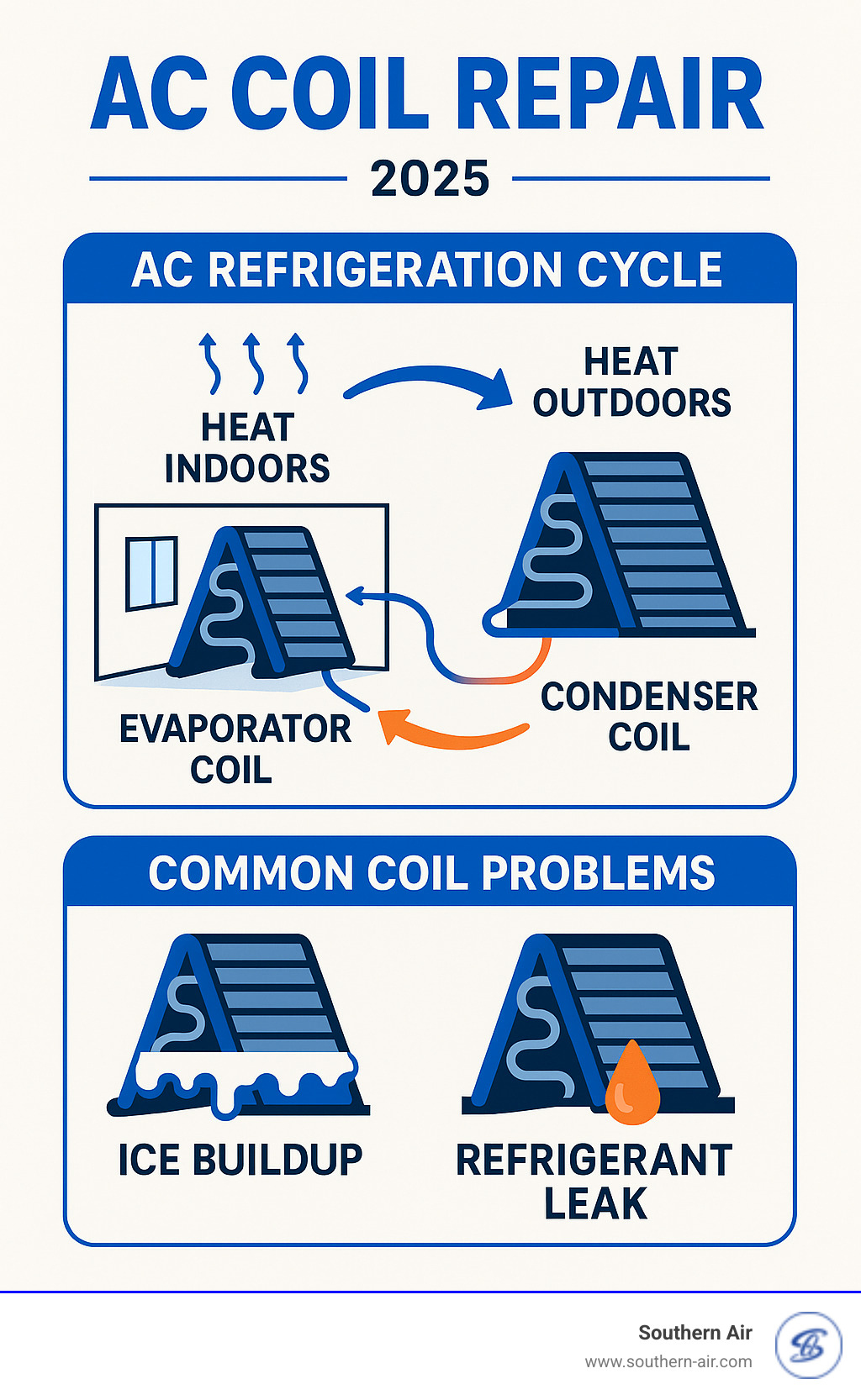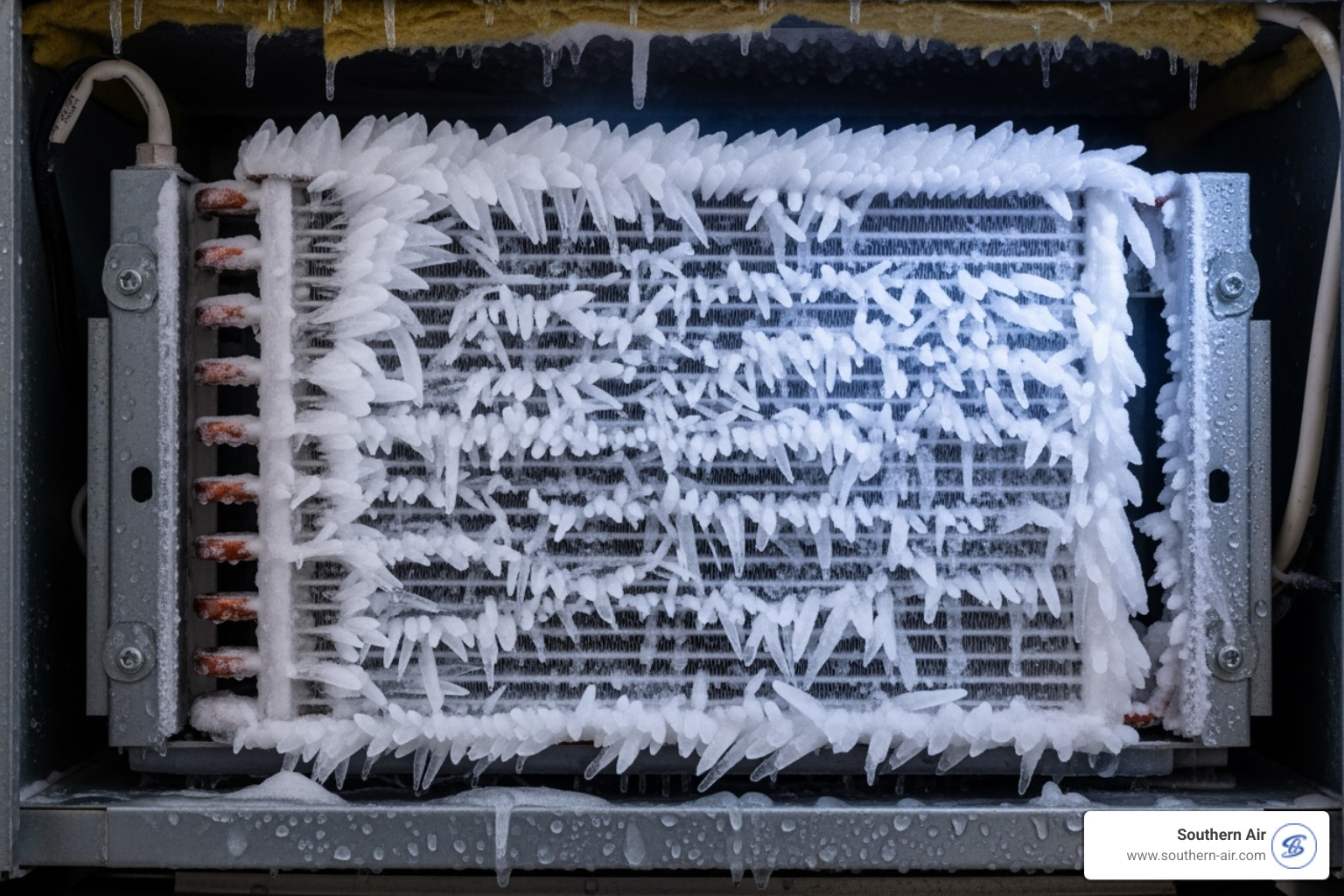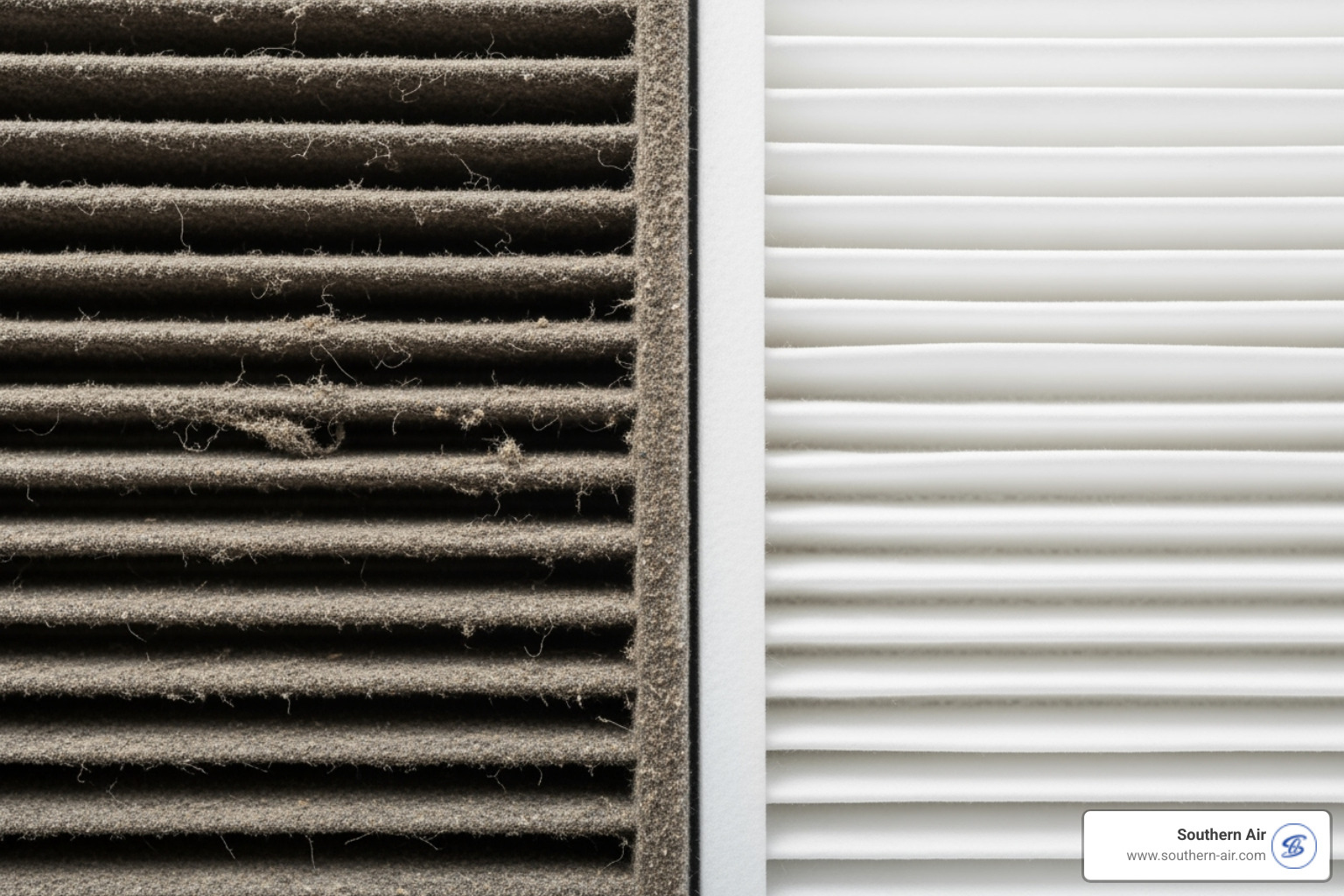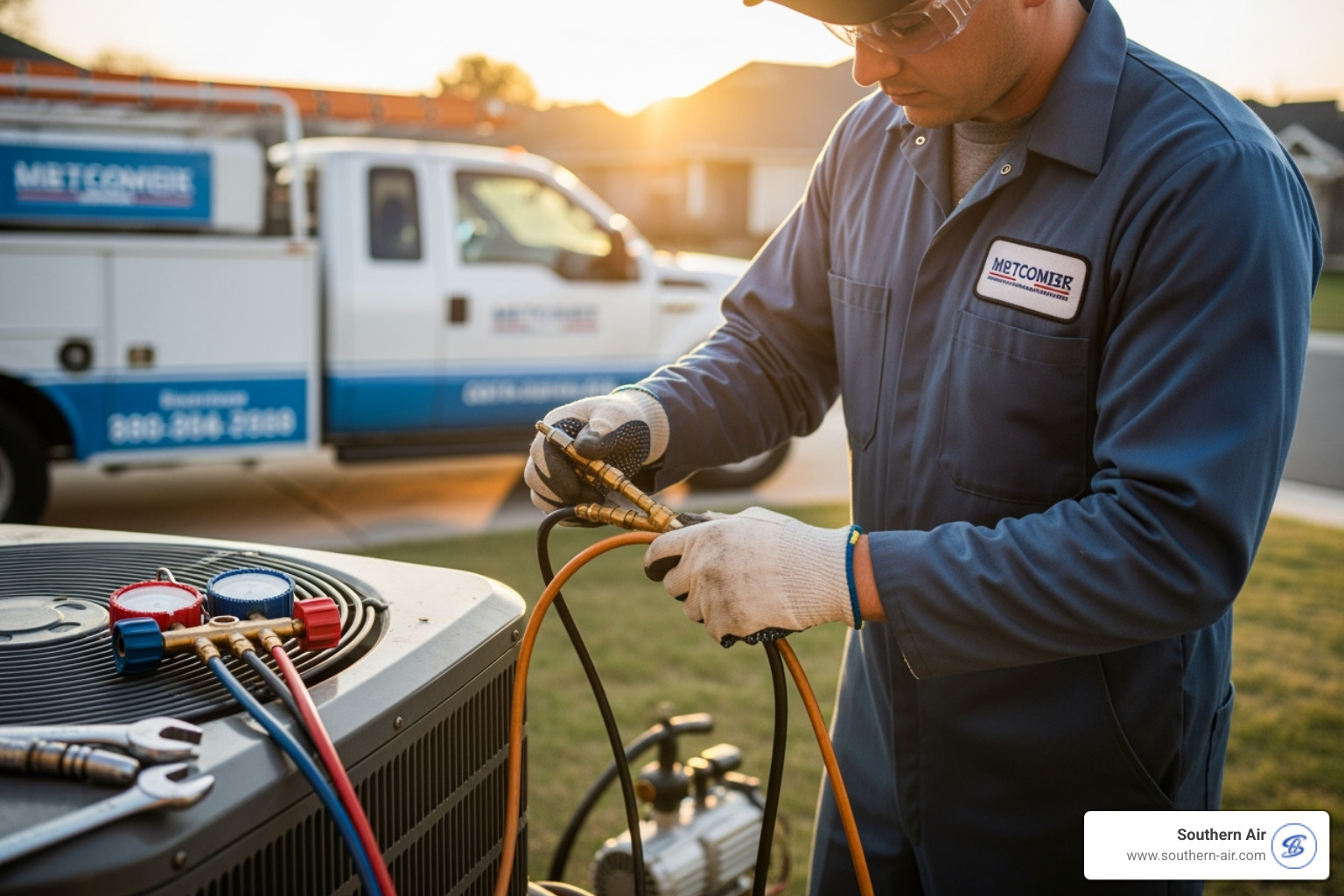Understanding AC Coil Problems and Your Repair Options
AC coil repair is a common but often misunderstood HVAC issue. When your air conditioner isn't cooling effectively or makes strange noises, the problem often lies with the coils.
Quick Answer: Can AC coil leaks be repaired?
- Small pinhole leaks: Sometimes repairable with brazing.
- Multiple or large leaks: Usually require coil replacement.
- R-22 systems: Better to replace the entire AC unit.
- R-410A systems: Repair may be cost-effective if under warranty.
- DIY repairs: Not recommended due to safety risks.
Your AC has two coils. The indoor evaporator coil absorbs heat from your home's air, while the outdoor condenser coil releases that heat outside. Both are filled with refrigerant that cycles between liquid and gas to transfer heat.
When these coils leak, freeze, or get dirty, your entire cooling system suffers. You may notice longer cooling cycles, higher energy bills, or a complete system failure. Fortunately, many coil issues are preventable with regular maintenance. Understanding your repair options helps you make a smart financial decision when problems do occur.

Signs Your AC Coil Needs Attention
Recognizing the signs of a failing AC coil early can save you from expensive repairs. Common issues like cracking, freezing, and dirt buildup all hurt your system's performance.

One of the first signs is reduced cooling or warm air from your vents. This forces your system to run longer, causing energy bills to skyrocket. You might also hear a hissing sound, a classic sign of a refrigerant leak, or see water leaks near your air handler if a frozen coil melts and overflows the drain pan. An AC that is short cycling (turning on and off frequently) also points to a coil problem.
Here are the top 5 signs your AC coil is failing:
- Reduced Cooling Power: Your home isn't getting cool, or the air feels warm.
- Increased Energy Bills: Your AC runs longer to cool your home, using more electricity.
- Hissing or Bubbling Noises: These sounds often indicate a refrigerant leak.
- Water Leaks: Puddles around your indoor unit can signal a frozen or leaking coil.
- Frequent Cycling (Short Cycling): Your AC turns on and off too often.
What a Leaking Evaporator Coil Looks and Sounds Like
A leaking evaporator coil severely impairs your AC's performance. While you may not see the leak itself, look for tell-tale signs like an oily residue around the coil, left behind by leaking refrigerant oil. The most obvious clue is bubbling or hissing noises as refrigerant escapes through a crack. A leak means your system can't cool effectively, leading to longer run times and higher energy costs. If you notice these signs, it's time for professional home air conditioner repair.More info about home air conditioner repair.
Identifying a Frozen Evaporator Coil
A frozen coil is another common problem. The most obvious sign is visible ice or frost on the indoor evaporator coil or on the refrigerant lines at the outdoor unit. A frozen coil restricts airflow, leading to poor cooling. As the ice melts, it can overflow the condensate drain pan, causing puddles of water near your indoor unit. Freezing is typically caused by dirty air filters, low refrigerant, or a clogged drain line. Addressing the root cause is critical to prevent further damage.More info about AC coil cleaning.
Common Causes of AC Coil Problems
Understanding the cause of your AC coil repair needs can help prevent future issues.

- Dirty air filters are the most common culprit. A clogged filter restricts airflow, which can cause the coil to freeze.
- Low refrigerant levels from a leak cause a pressure drop, making the coil excessively cold and leading to ice buildup.
- Blocked airflow from furniture covering vents or debris around the outdoor unit starves the coils of necessary air.
- A clogged drain line causes condensation to back up onto the coil, where it can freeze.
- Physical damage from accidents or wear and tear can puncture coils and cause refrigerant leaks.
- Corrosion from VOCs (volatile organic compounds) in household products like cleaners and air fresheners can slowly eat away at the copper coils over time.
Why Do AC Evaporator Coils Freeze?
A frozen evaporator coil is a sign of an underlying problem. The primary causes are:
- Restricted airflow: Dirty filters or blocked vents prevent warm air from reaching the coil, causing it to get too cold.
- Dirty coils: A layer of grime insulates the coil, preventing it from absorbing heat effectively and leading to freezing.
- Low refrigerant: A leak causes a pressure drop that super-cools the remaining refrigerant, freezing moisture from the air.
- Clogged condensate drain: Backed-up water makes direct contact with the cold coil and turns to ice.
- Faulty thermostat: An incorrect reading can cause the AC to run continuously until the coil freezes.
The Consequences of Ignoring AC Coil Repair Needs
Putting off AC coil repair will only lead to more expensive problems. You'll first notice higher energy bills as the system struggles to cool your home. The most significant risk is complete system failure. A struggling coil puts immense stress on the compressor, the most expensive component of your AC. Compressor damage often means you'll need to replace the entire unit, not just fix the coil.
Additionally, refrigerant leaks release harmful greenhouse gases and can create poor indoor air quality. The moisture from a malfunctioning coil can also lead to mold and mildew growth within your HVAC system.
More info about AC repair services.
AC Coil Repair vs. Replacement: Making the Right Financial Decision
When you need AC coil repair, you face a choice: fix the part or replace the system? The right financial decision depends on a few key factors.
Your system's age is the most important consideration. AC units typically last 10-15 years. Investing in a major repair for an older unit may not be wise, as other components are likely near the end of their lifespan.
Next, compare the repair cost versus replacement cost. A common rule of thumb is if the repair costs less than 30% of a full replacement and the unit is under 10 years old, a fix is usually reasonable. For older systems or more expensive repairs, replacement often provides better long-term value.
Warranty considerations are also critical. A new AC unit comes with a comprehensive 10-year warranty, while a replacement coil may only be covered for one year. Finally, consider SEER ratings. A new, higher-SEER system will deliver significant energy savings compared to an older, less efficient unit.
FeatureRepair AC CoilReplace AC CoilReplace Entire AC UnitProsLower upfront cost, quicker fix (if minor)Extends life of existing unit, better than temporary fixNew warranty, higher efficiency, improved comfort, modern refrigerantConsMay be temporary, no new warranty, old system issues persistStill paired with older components, shorter coil warrantyHigher upfront cost, more involved installationBest ForNewer units (under 10 years) with minor, single leaksUnits with localized coil issues, good overall conditionUnits over 10-15 years, R-22 refrigerant, frequent breakdowns
Factors Influencing the Cost of Replacement
Several factors determine the cost of an evaporator coil replacement. The average cost, including labor and refrigerant, ranges from $627 to $2,700, with a typical price around $1,350.
- Labor costs: HVAC technicians typically charge $75 to $150 per hour. The job's complexity determines the time required.
- Coil type and size: Different coil designs (A-coil, N-coil) have different prices. Larger AC units require larger, more expensive coils.
- Accessibility of the unit: A coil in a cramped attic or crawlspace will take more time and labor to replace than one in an easily accessible basement.
More info about HVAC systems.
How Refrigerant Type Affects Your Decision
The refrigerant in your system is a major factor in the repair-or-replace decision. If your AC uses R-22 refrigerant (Freon), you're dealing with a substance that has been phased out due to environmental concerns. It is now expensive and difficult to find. For R-22 systems, replacing the entire AC unit is almost always more cost-effective than a costly, temporary repair.
For systems using the current standard, R-410A, a repair might be viable. If the coil is under warranty, replacing it can be a good option. If the warranty has expired, compare the cost of a new coil (with a short warranty) to a new air handler (with a 10-year warranty).
More info about solutions for AC coil corrosion.
When to Replace the Entire AC Unit
Sometimes, upgrading the entire system is the best solution for a faulty coil. Consider a full replacement if:
- Your system is over 10-15 years old.
- It uses R-22 refrigerant.
- The repair costs exceed 30-50% of the cost of a new unit.
- You are experiencing frequent breakdowns.
- You have mismatched indoor/outdoor units from a previous repair, which hurts efficiency.
The AC Coil Repair Process: DIY Risks vs. Professional Solutions
When your AC coil fails, you might consider a DIY fix. However, AC coil repair is a complex procedure that requires specialized training and tools, making it a job best left to professionals.

The professional process involves more than just patching a hole. Technicians use high-temperature torches for brazing and soldering leaks, a delicate process that can easily cause more damage if done incorrectly. Afterward, the system must be purged with nitrogen, vacuumed to remove all moisture, and recharged with a precise amount of refrigerant. Attempting this process yourself can also void your manufacturer's warranty.
The Risks of Attempting AC Coil Repair Yourself
Trying to save money with a DIY repair can lead to a costly and dangerous outcome. The primary risks include:
- Refrigerant exposure: This chemical can cause severe frostbite and is a suffocation hazard in enclosed spaces.
- Electrical shock hazards: AC units use high-voltage electricity that can cause serious injury or death.
- Further system damage: An incorrect repair can quickly turn a small leak into a catastrophic failure of a major component like the compressor.
- Improper diagnosis: You might fix a symptom while missing the root cause, leading to recurring problems.
- Legal issues: You need EPA certification for refrigerant handling to legally purchase or work with refrigerants.
Can AC Evaporator Coil Leaks Be Repaired?
Yes, some AC evaporator coil leaks can be repaired, but it depends on the leak's size, location, and quantity.
A single, small pinhole leak in an accessible spot can sometimes be sealed by a skilled technician using brazing (a form of welding). Epoxy kits are temporary fixes at best and are not a professional or lasting solution.
Unfortunately, replacement is often the only reliable option. Modern coils are complex, with many small passages and connections. Multiple leaks, widespread corrosion, or damage in a hard-to-reach area makes a lasting repair impractical. When you have a coil problem, a professional assessment is needed to determine if repair is feasible or if replacement is the better choice.More info about HVAC repair.
Preventing Future Coil Issues: A Proactive Maintenance Guide
Most AC coil repair issues are preventable with a proactive maintenance routine. Keeping your coils clean and ensuring proper airflow is the key to a long and efficient system life.
The most important step is regular filter changes. Swap your air filter every 30-90 days to prevent the dust and debris buildup that causes most coil problems. Annual professional tune-ups, ideally in the spring, are also crucial. A technician will clean your coils, check refrigerant levels, and identify minor issues before they escalate.
You should also focus on keeping coils clean and ensuring proper airflow by keeping vents and registers unobstructed. A lesser-known tip is to use low-VOC products in your home. Chemicals from some cleaners and air fresheners can create corrosive acids that eat away at copper coils, leading to leaks.
The Benefits of Routine AC Coil Cleaning
Regularly cleaning your AC coils offers significant benefits. Clean coils transfer heat more effectively, which leads to:
- Improved efficiency and lower energy bills: Your system runs less to achieve the same cooling.
- Better indoor air quality: Prevents the growth of mold and mildew on dirty, damp coils.
- Extended system lifespan: Reduces strain on components and prevents issues like freezing, helping your AC reach its full 10-15 year lifespan.
Benefits of Routine AC Coil Cleaning.
Proper AC Coil Maintenance You Can Do at Home
Between professional visits, you can perform simple tasks to protect your coils:
- Change air filters monthly: This is the single most effective task to prevent coil freezing.
- Keep vents clear: Ensure furniture and other items are not blocking return or supply vents.
- Clean the outdoor unit: Gently rinse away leaves, grass, and debris from the condenser unit with a garden hose, ensuring at least two feet of clearance around it.
- Check the drain line: Pour a cup of distilled vinegar down the condensate drain line access point a few times a year to prevent algae clogs and water backup.
Proper AC Coil Maintenance at Home.
Frequently Asked Questions about AC Coil Repair
We've been handling AC coil repair in Lynchburg for decades and have answered thousands of questions. Here are the most common ones.
What is the typical lifespan of an evaporator coil?
With proper maintenance, an evaporator coil should last 10-15 years, often the full lifespan of the AC unit. However, neglect, corrosion, and dirt buildup can cause it to fail much sooner. Regular cleaning and annual professional tune-ups are the best way to maximize its lifespan.
What are the consequences of ignoring a leaking evaporator coil?
Ignoring a leak leads to poor cooling and higher energy bills. More importantly, it puts severe strain on the AC compressor, which can lead to a premature and very expensive failure. Leaking refrigerant is also a health risk and harms the environment. Prompt repairs save money and protect your system.
Is it more cost-effective to replace an evaporator coil or the entire AC unit?
This depends on three key factors:
- Age: If your unit is under 10 years old, a repair often makes sense. For units over 10-15 years old, replacement is usually a better investment.
- Refrigerant Type: If your system uses the obsolete and expensive R-22 refrigerant, replacement is almost always the recommended course of action.
- Cost: If the repair cost is more than 30-50% of the price of a new unit, replacement offers better long-term value with higher efficiency and a new warranty.
Your Local Experts for AC Coil Issues
When your AC coil has a problem, you need a trusted expert to restore your comfort. A faulty coil doesn't just make your home hot; it drives up utility bills and puts your entire HVAC system at risk.
Understanding the warning signs, from hissing sounds to ice buildup, allows you to act before a small issue becomes a major expense. Whether you need a cleaning, repair, or a full replacement, prompt professional service is key to protecting your investment.
At Southern Air, we've helped Lynchburg-area families stay comfortable since 1946. Our experienced team provides honest assessments and clear explanations, helping you choose the solution that best fits your home and budget. We'll tell you if a repair is cost-effective or if a replacement offers better long-term value.
Your comfort is our priority, and AC problems don't keep business hours. That's why we're here to help when you need us most.
